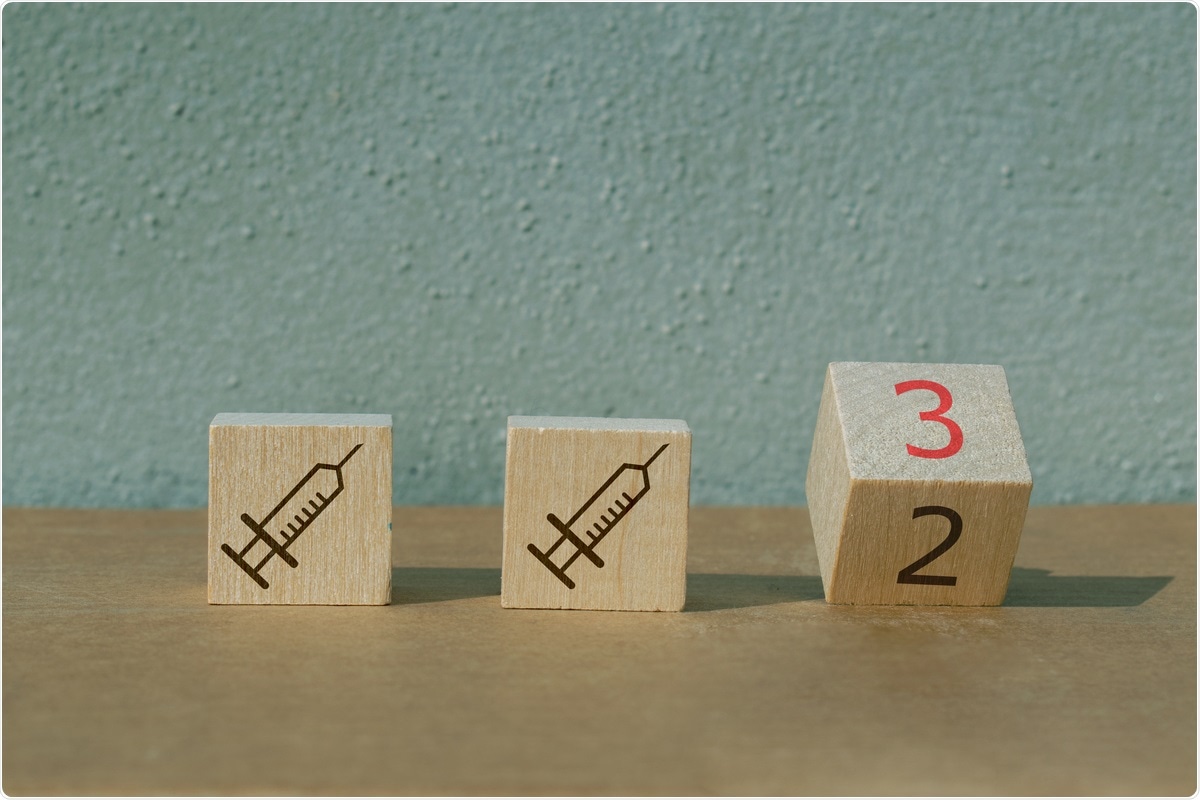In December 2020, emergency approval was announced by the food and drug administration for the use of the BNT162b2 mRNA vaccine against severe acute respiratory syndrome coronavirus 2 (SARS-CoV-2). Also, in December 2020, Israel announced the rollout of their vaccination program with the same vaccine for all the population of people aged sixteen and above. As of April 2021, over 50% of people aged sixteen and above and 88% of people fifty and above were fully vaccinated, which appeared to correspond with a decrease in cases to one hundred and forty per day.
 Study: Effectiveness of a third dose of BNT162b2 mRNA vaccine. Image Credit: No-Mad/ Shutterstock
Study: Effectiveness of a third dose of BNT162b2 mRNA vaccine. Image Credit: No-Mad/ Shutterstock
Following results from studies conducted stating that vaccine-elicited immunity was waning six months after the first national vaccination program, the Israel Ministry of Health began a second national vaccination program in August 2021, which would consist of third doses of the BNT162b2 vaccine. These vaccination programs were aimed at individuals ages sixty and over, then coming down the age brackets on a weekly basis.
In a study published in the Journal of Infectious Diseases, a group of researchers from Maccabi Healthcare Services performed a retrospective cohort study to determine vaccine effectiveness (VE) of a third dose. Over a 70 day period from August to October, the authors compared infection rates between individuals who had received two doses with those receiving a third dose.
The study
Nine hundred forty-seven thousand one hundred thirty-one individuals met the inclusion criteria set forth by the authors, of which 8.6% had only received two doses of the vaccine by February 2021, and 91.4% had received a third dose between July and mid-October 2021. Of the individuals who received a third dose, 83.6% were included in both the second and third dose groups due to the time in which the third dose was administered. Therefore the participants were grouped by “only two doses”, “became three doses”, and “only three-doses”.
The results show that crude VE rates were higher when compared to adjusted VE rates. In the context of the different age groups, crude VE rates were 1.9% higher for the participants under sixty when compared to those over sixty. With both age groups, crude VE rates were higher than adjusted VE, with a difference in adjusted VE attenuated between the two age groups.
When results were arranged according to follow-up days, crude VE appeared to be increased in those with a later follow-up period compared to those with an earlier follow-up period. Again, the adjusted rates were lower than crude VE rates in both groups, which was shown via a smaller difference between groups. The group within this study that had only received two doses of the vaccine were more likely to be younger, from a lower socioeconomic background, and/or part of a minority group.
From the GLM model of the total study population, other measures were included to assess the outcome of infections that were not related to the number of doses, which included age group, population group, socioeconomic status, calendar period, and religiosity. Within the first thirty days (third ten-day period compared to the first ten day period), the risk of infection increased by 1.5-fold but then decreased by 0.28-fold in the seventh ten-day period.
Decreasing age was related to an increased risk of infection. There was a 1.93-fold increase in the risk of infection for the minority population of Orthodox Jews, while the Arab minority population had a 0.65-fold lower risk of infection. A decrease in socioeconomic status was associated with an increased risk of infection, 1.25 higher for middle socioeconomic status and 1.48 higher for lower socioeconomic status.
Implications
Although this study provides promising results, it was based on a relatively short follow—up period. Even though the results were adjusted for age, there was a large over-representation of the sixty and above age group in the group of individuals who received a third dose, due to the strategy implemented in Israel. Allowing for a longer follow-up period would have given the time for more age groups to receive their third dose and balanced the results.
In Israel, it is a voluntary decision to receive the vaccine or to take a PCR test, so it is not possible to rule out bias. Despite the limitations within this study, the results show that implementing a third dose of coronavirus disease 2019 vaccine into the population effectively reduced the overall infection rates.